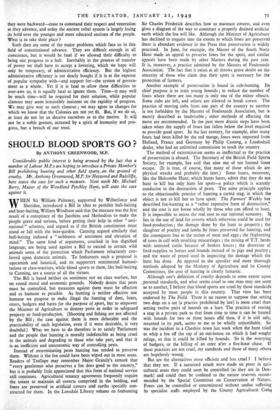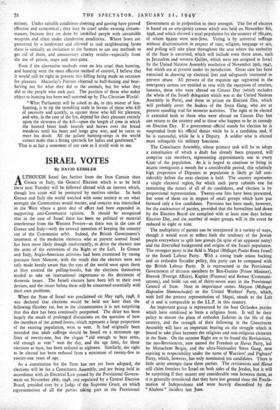SHOULD BLOOD SPORTS GO ?
By ANTHONY GREENWOOD, M.P.
Considerable public interest is being aroused by the fact that a number of Labour M.P.s are hoping to introduce a Private Member's Bill prohibiting hunting and other field sports._ on the ground of cruelty. Mr. Anthony Greenwood, M.P. for Heywood and Radcliffe, here states the case for such a measure. Next week Mr. Michael Berry, Master of the Woodland Pytchley Hunt, will state the case against it.
WHEN Sir William Pulteney, supported by Wilberforce and Sheridan, introduced a Bill in 1802 to prohibit bull-baiting and bear-baiting, William Windham said that the measure was the first result of a conspiracy of the Jacobins and Methodists to make the people grave and serious, before getting their help in other " anti- national " schemes, and argued as if the British constitution must stand or fall with the bear-garden. Canning argued similarly that bull-baiting induced a " nobleness of sentiment and elevation of mind." The same kind of arguments, couched in less dignified language, are being used against a Bill to extend to certain wild animals some of the protection which Parliament reluctantly con- ferred upon domestic animals. To foxhunters such a proposal is squeamish and fanatical, and its supporters sentimental humani- tarians or class-warriors, while blood sports to them, like bull-baiting to Canning, are a source of all the virtues.
The Bill is based neither on sentiment nor on class warfare, but on sound moral and economic grounds. Nobody denies that pests must be controlled, but measures against them must be effective and as humane as possible. As hunting is neither effective nor humane we propose to make illegal the hunting of deer, foxes, otters, badgers and hares for the purpose of sport, but to empower the Minister of Agriculture to destroy pests in order to safeguard property or food-production. (Shooting and fishing are not affected by the Bill ; the case against them is more debatable and the practicability of such legislation, even if it were desirable, is very doubtful.) What we have to do therefore is to satisfy Parliament and the people that hunting is morally indefensible as being cruel to the animals and degrading to those who take part, and that it is an inefficient and uneconomic way of controlling pests.
Instead of exterminating pests hunting has tended to preserve them. Without it the fox could have been wiped out in most areas. Readers of Trollope may remember Major Grantly's remark that "every gentleman who preserves a fox does good to the country," but it is probably little appreciated that this form of national service still continues. Agricultural tenancy agreements frequently require the tenant to maintain all coverts comprised in the holding, and foxes are preserved in artificial coverts and earths specially con- structed for them. In the Lonsdale Library volume on foxhunting Sir Charles Frederick describes how to maintain coverts, and even gives a diagram of the way to construct a properly drained artificial earth which the fox will like. Although the Minister of Agriculture has declined to enquire into the extent to which foxes are preserved there is abundant evidence in the Press that preservation is widely practised. In June, for example, the Master of the South Notts Hunt made an appeal to preserve foxes for the sport, and similar appeals have been made by other Masters during the past year. It is, moreover, a practice admitted by the Masters of Foxhounds Association. The fact that it exists at all throws grave doubt on the sincerity of those who claim that their sport is necessary for the protection of farmers.
Another example of preservation is found in cub-hunting. Its chief purpose is to train young hounds ; to reduce the number of foxes where there are too many is only one of the minor objects. Some cubs are left, and others are allowed to break covert. The practice of moving cubs from one part of the country to another is not forbidden by the Masters of Foxhounds Association, but is merely described as inadvisable ; other methods of effecting the move are recommended. In the past more drastic steps have been taken when the supply of foxes has fallen below the level required to provide good sport. In the last century, for example, after many foxes had been killed by the red mange, foxes were imported from Holland, France and Germany by Philip Castang, a Leadenhall dealer, who had an unlimited commission to stock the country.
The method of extermination seems as ineffectual as the practice of preservation is absurd. The Secretary of the British Field Sports Society, for example, has said that nine out of ten hunted foxes escape. (It is true, of course, that many of those which do are physical wrecks and probably die later.) Some hunts, moreover, like the Holcombe Hunt, which hunts hares, admit that they do no' hunt to kill but only hunt for sport—a policy which is scarcely conducive to the destruction of pests. The same principle applies to the objectionable practice of hunting a carted stag, in which the object is not to kill but to have sport. The Farmers' Weekly has described fox-hunting as a " rather expensive form of destruction," and the cost is not borne wholly by those who can afford to hunt.
It is impossible to assess the real cost to our national economy. lc lies in the use of land for coverts which otherwise could be used for food-production ; the damage done by the hunt to property ; the slaughter of poultry and lambs by foxes preserved for hunting, and the consequent loss to the nation of meat and eggs ; the frightening of cows in calf with resulting miscarriages ; the mixing of T.T. herds with untested cattle because of broken fences ; the diversion of food-supplies to horses and hounds instead of to pigs and poultry ; and the waste of petrol used in inspecting the damage which the hunt has done. As opposed to the speedier and more thorough methods adopted by the Ministry of Agriculture and its County Committees, the cost of hunting is clearly fantastic.
Although one's definition of cruelty depends to some extent upon personal standards, and what seems cruel to one man may not seem so to another, I believe that blood sports are cruel by those standard3 accepted by most people in this country. That view has been endorsed by The Field. There is no reason to suppose that setting two dogs on a cat (a practice prohibited by law) is more cruel than setting twelve pairs of hounds on a hare. The practice of rearing a stag in a private park so that from time to time it can be hunted with hounds for two or three hours Mkt then, if it is still safe, returned to its park, seems to me to be wholly unjustifiable. So was the incideni in a Cheshire town last week when the hunt tried to whip a fox off the top of an out-house on which it had sought refuge, so that it could be killed by hounds. So is the worrying of badgers, or the killing of an otter after a five-hour chase. If these practices are not cruel, my standards and those of many others are hopelessly wrong.
But are the alternatives more efficient and less cruel ? I believe that they are. If a sustained attack were made on pests in agri.
cultural areas they could soon be controlled (as they are in Den- mark) and could then be confined to the nature reserves recom- mended by the Special Committee on Conservation of Nature.
Foxes can be controlled or exterminated without undue suffering by specialist staffs employed by the County Agricultural Coati
mimes. Under suitable conditions shooting and gassing have proved effective and economical ; they may be cruel under existing circum- stances, because they are done by unskilled people with unsuitable weapons and often under clandestine !conditions. Where foxes are preserved by a landowner and allowed to raid neighbouring farms there is virtually an invitation to the farmers to use any methods to get rid of them, and unnecessary cruelty results—especially from the use of poison, traps and shot-guns.
Even if the alternative methods were no leis cruel than hunting, and hunting were the most efficient method of control, I believe that it would still be right to prevent this killing being made an occasion for pleasure. Macaulay's Puritan objected to bull-baiting and bear- ba;ting not for what they did to the animals, but for what they did to the people who took part. The position of those who today object to hunting has been well summed up by The Christian World: "What Parliament will be asked to do, in this matter of fox- hunting, is to tip the trembling scale in favour of those who. kill of necessity and quickly, as against those who kill for pleasure, and who, in the case of the fox, depend for their pleasure entirely upon the slowness of the kill—upon the length of time in which the hunted beast leads hounds and horses over the broad meadows until his heart and lungs give way, and he turns to meet his death. All the gallant hunting-songs in the world cannot make that a fitting spectacle .for ladies and gentlemen." .
-That is as fair a statement of our case as I could wish to see.







































 Previous page
Previous page